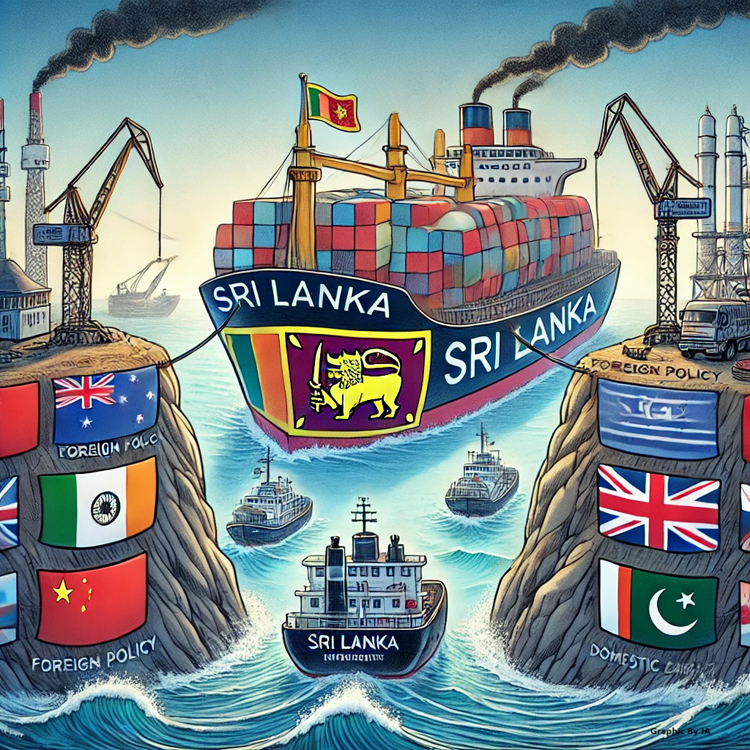August, 30, 2024

By Jithendra Antonio
As the presidential election draws near, the people are eagerly awaiting the next era of Sri Lanka. There is no doubt that the result of the election will have a lasting impact on the nation and the economy. One of the most important aspects that the next government should focus on, is not just maintaining, but upping the pace of Foreign Direct Investment (FDI) that the incumbent government has been able to secure.
When it comes to foreign policy, Sri Lanka has maintained a strong non-aligned stance, not just in name. We have close diplomatic relations with countries who are often at the opposite end of ideological or political spectrum such as The United States, China, The United Kingdom, Russia, India, Japan and Pakistan. This has helped us to engage with the governments of these countries in a manner that benefits everyone. Here we are able to keep our interest in the centrepoint and forge mutually beneficial relationship without being a pawn in the political game of any nation.
While it is true that certain parties and politicians may have different views regarding international relations, it is vital that we as a nation maintain our non-aligned stance. Historically, and it is true for most nations, when even governments change, there is typically a continuity of foreign policy.
Thanks to this stance, Sri Lanka has secured numerous FDIs from multiple countries. A lot of these projects, such as the ones in ports, renewable energy and infrastructure will have a long lasting effect on the economy of the country. It is vital that this is maintained and given the necessary support by the government so that the citizens can reap the benefits of them.
Losing FDIs can be absolutely detrimental to a country’s economy. The best example is from our very own country, where the previous government stopped Western Region Megapolis Light Rail Transit (colloquially referred to as the ‘Light Rail Project’).
The project, valued at approximately US$1.5 billion, was initiated in 2017 during Maithripala Sirisena's presidency and was considered the largest foreign-funded infrastructure undertaking in Sri Lanka. The Japan International Cooperation Agency (JICA) financed the project with an exceptionally low-interest loan of just 0.1%, repayable over 40 years with a 12-year grace period. However, in September 2020, the then government canceled the project.
This resulted in not just monetary loss for the country but also derailment of a public transportation infrastructure project, which could have helped the citizens and also the environment.
In 2022, Sri Lanka faced its worst economic crisis since independence. The Light Rail System may have helped the government mitigate the economic crisis without it getting so severe. During that time, transportation was also a serious issue for the general public who had limited access to vehicles, fuel and public transportation. The light rail could have greatly aided in this aspect as well.
But this was not the first instance of FDIs being driven out of the country. In the 1960s and the early 1970s, the then government nationalized key sectors of the country’s economy, including transport, banking, insurance and segments of the energy sector. Prior to this, companies such as British Petroleum, The Shell Company and a host of other international companies had a significant presence in the country and employed hundreds of people – directly and indirectly, besides contributing to the exchequer by way of taxes. This nationalization drive drove these companies out of the country.
Even though the economy was opened up in 1977, the subsequent governments could not convince these companies to come back to the country. It is very difficult to rebuild trust amongst foreign investors if they once retreat owing to sudden policy changes.
The average person may not always understand the direct and indirect benefits of FDIs such as these, but they will feel the repercussions of not having them.
While it is understandable that each new president has their own vision for the nation, it is vital to keep the future of the country in mind. The benefits of FDIs are not just limited to the country today but are also beneficial to the future generations as well.
Global money is fungible, and it will always flow to the next most attractive destination. Here is hoping that the new regime, whichever it is, while encouraging a conducive FDI environment also ensures a level playing field for the domestic industry.

(The writer is a Consultant specialised in Data Analytics with a Special Focus on Sri Lanka’s Future Direction, and in the fields of Sustainable Energy, ESG, Investments and telecommunications. He can be reached at jithendra.antonio@gmail.com.)
Video Story